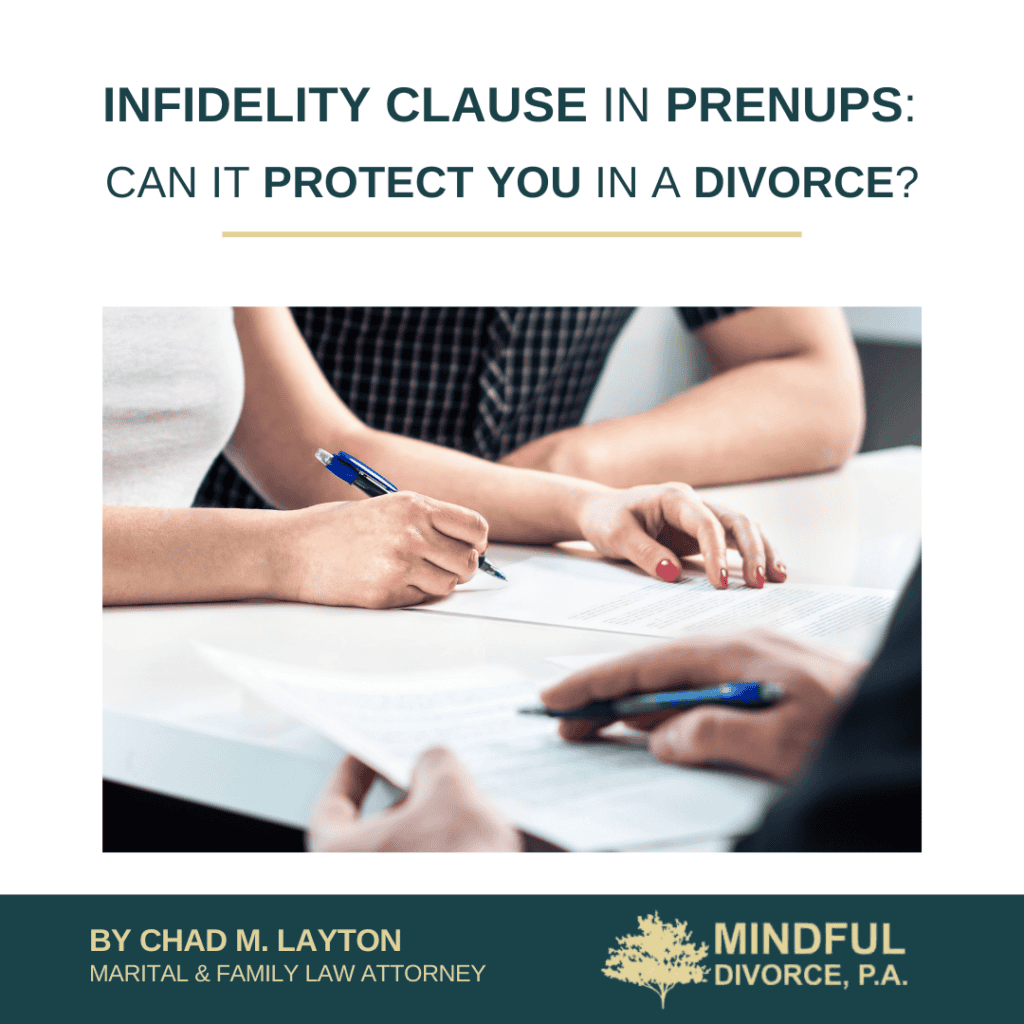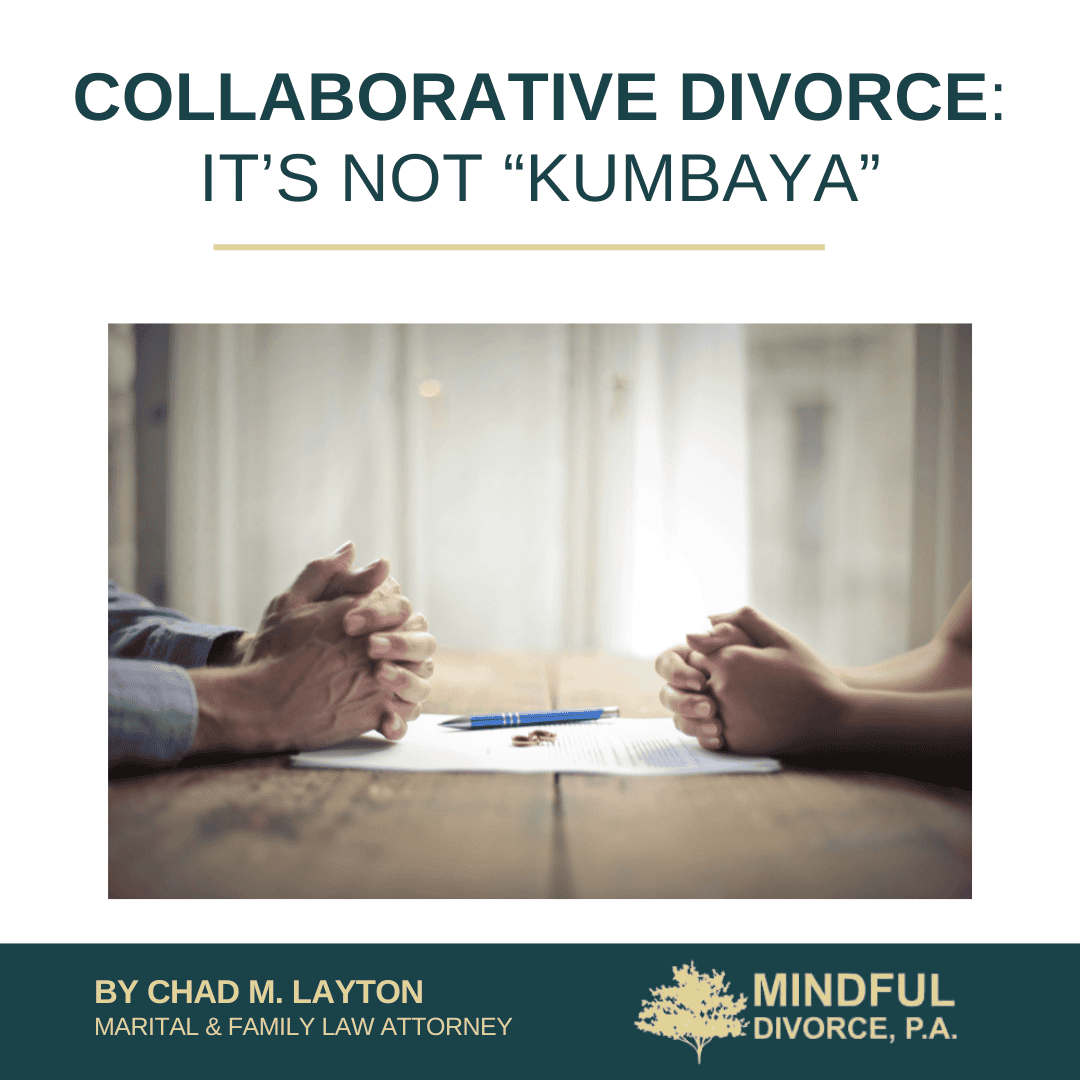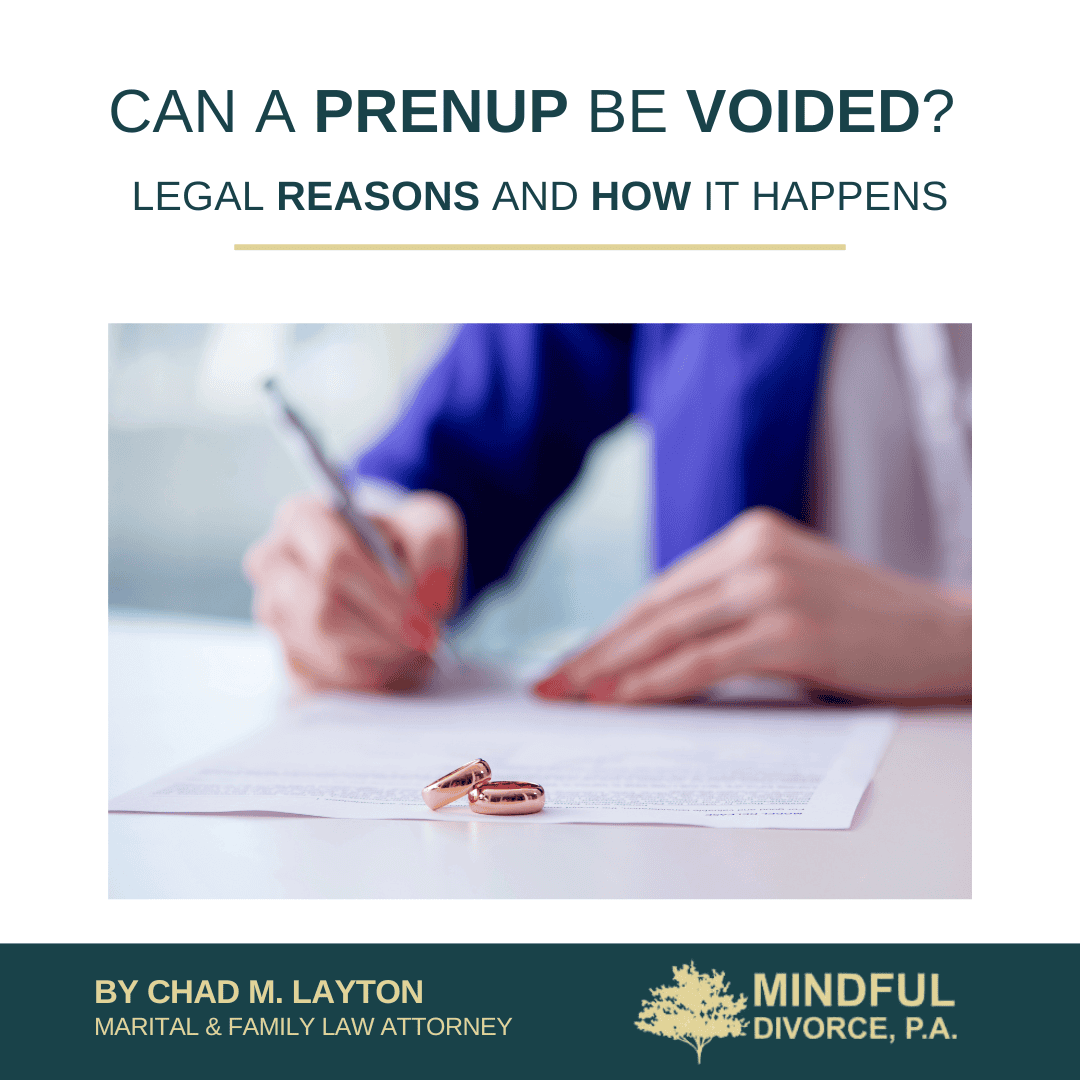
How do you cope when the person you trust most risks the security of your marriage through unfaithfulness? Sometimes, couples try to address this worry before saying “I do” with a prenuptial agreement.
Infidelity clauses, often called “bad boy” or “bad girl” clauses, have gained attention for assigning financial repercussions after an act of adultery. Do these provisions really protect you in a Florida divorce, or do they lead to needless disputes?
Below, we explore how an infidelity clause works, how Florida courts view them, and where challenges may lie.
What is an Infidelity Clause?
An infidelity clause is a term in a prenuptial agreement that aims to penalize a spouse who engages in an extramarital relationship. This clause generally specifies financial consequences for the spouse who steps outside the marriage, such as reduced alimony or dividing property in the other spouse’s favor. Some people see it as a moral deterrent intended to encourage loyalty within the marriage. Others see it as a guarantee of compensation if adultery disrupts the union.
Still, each union is different, so these clauses tend to pinpoint specific acts that count as cheating, including intimate contact, online flirting, or long-term affairs. This specificity matters because courts need clarity regarding what triggers the penalty.
Florida’s Stance on Infidelity and Prenups
Before we move into how an infidelity clause might affect your rights, let’s take a moment to recall that Florida is a no-fault divorce state. This means a marriage can be dissolved regardless of a spouse’s wrongful conduct. Property division, child support, and alimony calculations typically proceed without emphasis on wrongdoing, so a spouse’s hurtful actions are not the legal bedrock of the court’s final judgments.
As a result, Florida law does not automatically penalize a spouse for straying. Marital misconduct is not the main point. Still, many couples choose to include infidelity clauses in hopes of guarding their emotional and financial interests. This decision often carries risk, though, since the courts have the power to evaluate whether this portion of the prenup aligns with public policy.
Are Infidelity Clauses Enforceable in Florida?
There is no absolute guarantee that the courts will uphold an infidelity clause. Yet, there is a noteworthy Florida case called Weymouth v. Weymouth, where a prenuptial agreement contained language stating that if adultery occurred, the non-cheating spouse could seek alimony per Florida law, even though alimony had initially been waived. When the husband’s affair was established, the court set aside the original alimony waiver. The pronouncement, in that case, showed that some Florida courts are willing to honor prenuptial terms addressing adultery, but the final ruling depends on multiple facts. This outcome makes infidelity provisions less predictable than many assume.
The concept of fault in marriage runs counter to Florida’s general no-fault approach, so these clauses can spark legal arguments. Some spouses might argue that penalizing someone for infidelity contradicts established Florida policy. On the other hand, couples who want such clauses may assert that the agreement is voluntary and that both parties fully understood its implications. Judges analyze these disputes on a case-by-case basis.
Challenges to Infidelity Clauses
Infidelity clauses are often the most debated parts of a prenuptial agreement. A key sticking point is how to define infidelity. Is it strictly physical interaction, or does it include flirtatious messaging and expressions of emotional closeness? The more broadly it is worded, the easier it is to have confusion over whether the clause is triggered.
Beyond that, an infidelity clause can fail if the court sees it as punishing a spouse’s conduct well beyond Florida’s routine no-fault approach. Another problem is proving the breach. Was there honest proof, or is one spouse hurling accusations to avoid paying support? These uncertainties lead many couples to avoid such clauses entirely. Still, some believe the emotional security is worth the legal complexity.
Grounds for Challenging a Prenuptial Agreement in Florida
A spouse hoping to challenge a prenuptial agreement can raise a set of well-known objections. These objections may either be powerful enough to invalidate the entire agreement or they may target just one specific section, such as an infidelity clause. If you have concerns, be aware of the following reasons a prenup might fail in court:
- The agreement was not entered into willingly.
- One spouse concealed property or income (fraud).
- One spouse used pressure or threats to force the other into signing.
When an agreement addresses infidelity, these factors can complicate the dispute. For instance, a spouse may argue that the clause is so harsh that it sheds light on possible coercion. If a judge agrees, the entire prenup or some of its parts could be struck down. It depends heavily on which facts come to light during the proceedings.
Lack of Voluntariness
Florida courts disregard a prenup if either spouse signed under pressure. Perhaps the marriage date was so near that one spouse felt forced to agree, or maybe one spouse threatened to call off the wedding if the agreement was not signed. This is why each spouse is advised to sign a prenuptial agreement freely and far in advance of the big day. A coerced signature may not hold up.
Fraud
Nobody can hide assets when setting up a prenup. Transparency is a basic rule here. If a spouse attempts to conceal large accounts, real estate, or other property, this will cast doubt on the entire agreement. When infidelity clauses are included, a court will pay extra attention to whether both spouses acted with honesty when signing.
Duress or Coercion
A prenuptial agreement made under duress is not likely to remain intact. Courts look for balanced negotiations and enough time to review the agreement. That can mean getting separate legal counsel and making sure complex details are openly disclosed. Allegations of duress often involve a spouse who learns of the agreement at the last minute, with no time to consider the ramifications.
The Importance of Legal Counsel
Having guidance from a divorce lawyer when crafting an infidelity clause is valuable for many reasons. You want to confirm that the agreement fits Florida law and that each provision is explained in plain terms. A knowledgeable attorney can also anticipate problems, such as unrealistic demands or murky definitions of cheating, which might cause the clause to be thrown out in court.
During a divorce, lawyers play a vital role in checking the enforceability of each part of the agreement. They can inform you if the infidelity clause is too vague or if the procedures for proving misconduct are unreasonable. That kind of advice can help you avoid spending unnecessary time and money fighting over whether someone’s text messages recast alimony rights.
Plus, an attorney can provide an honest view of the pros and cons of including an infidelity clause. Such a term might set the stage for deeper mistrust since it continually reminds spouses of potential financial punishments. On the other hand, for some couples, it may offer peace of mind if they both agree that fidelity must be spelled out clearly.
Need Help with a Florida Divorce? Contact Mindful Divorce, P.A.
Divorce is seldom easy, but having access to informed advice can make a real difference. At Mindful Divorce, P.A., we encourage you to reach out if you are contemplating a prenup, questioning an infidelity clause, or seeking to resolve any Florida family law matter.
Call us at 561-537-8227 or visit our Contact Us page for help. Our transparent fixed-fee approach brings clarity throughout this demanding time. We focus on helping you move forward with stability, whether you are enforcing or challenging a prenup, discussing alimony concerns, or working through child-related issues.



